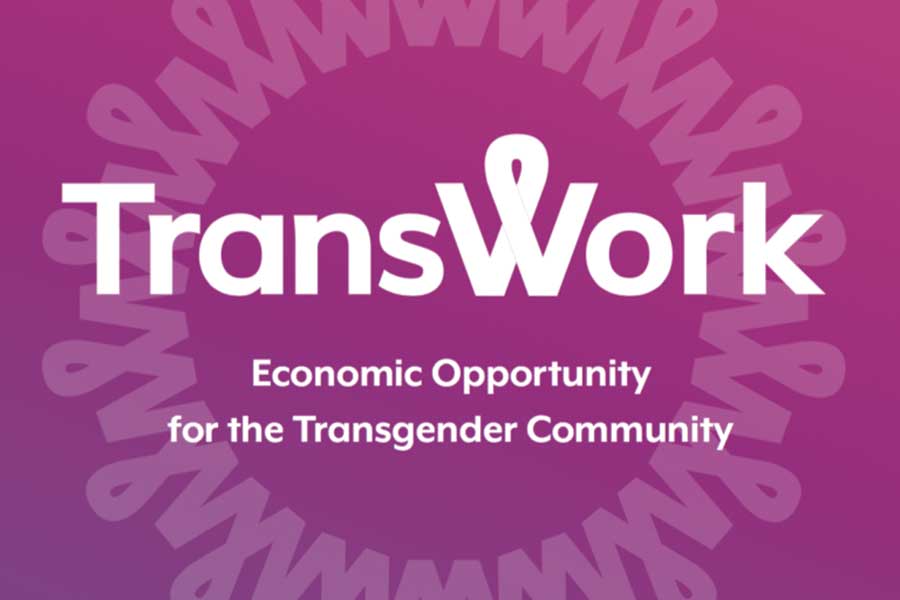
TransWork, an employment initiative for trans, nonbinary and gender-nonconforming people, held its second job fair Monday evening in Center City. The event, which took place at Independence Live on Market Street near 19th, was hosted in collaboration with health insurance organization Independence Blue Cross, which is among the largest employers in the region. About 25 people attended the event to give resumes to recruiters and learn about recruitment and hiring at the company, along with diversity and inclusion efforts.
TransWork is a program that launched this fall out of the Independence Business Alliance, Philadelphia’s LGBT Chamber of Commerce. The endeavor has two arms: one focused on employment and the other on entrepreneurship, said Marcus Iannozzi, a trans man and Transwork’s founder and co-chair. The program is first focusing on developing the employment branch, and then will turn more attention to the entrepreneurship side.
“There are many trans folks out there with job experience, with skill, with education, and they are unable to find employment simply because they’re transgender or there are issues with their documentation [or] they may be visibly trans and just being discriminated against,” Iannozzi added. “There are so many reasons why they are unable to obtain employment and these job fairs and the TransWork program, in general, is just designed to remove that barrier and say, ‘This is an employer who wants to hire trans people and whoever is right for the job.’”
The inaugural TransWork job fair took place in September in partnership with the Philadelphia International Airport, which follows the city’s LGBTQ nondiscrimination ordinance as an official department of the City of Philadelphia. Collaborating with major corporations for the events encourages other employers to get on board with squashing the barriers that trans, nonbinary and gender-nonconforming folks face during a job hunt, Iannozzi added.
Before partnering with an organization, TransWork assesses the inclusivity of the company’s policies and practices. TransWork then educates employers on how to improve their work environments to ensure safety for trans, nonbinary and gender-nonconforming job candidates.
“Now they don’t have this worry or this burden, this cloud hanging over their head because they know that they’ve been cleared to go to this place,” said Jone Magagna, TransWork co-chair.
Two years of focus groups revealed many trans folks are “skittish” about applying to jobs in person, she added, which prompted TransWork to establish resume and interview workshops. To further remove anxiety from the application process, TransWork launched an online job bank in mid-October that lists open positions with pre-screened companies.
The program now aims to launch a resume bank so employers can search for ideal job candidates.
Valentina Rosario, an Afro-Latinx trans woman, attended the TransWork fair to look for a position with more career growth opportunities. Trans people are often overlooked for employment opportunities, she said.
“There’s already a lot of misconceptions about trans individuals, so we’re kind of pushed to the back burner,” added Rosario, who works at a nonprofit. “There’s still a lot of stigma around trans individuals and work ethics.”
Rosario once attended a group interview alongside two cisgender people for a job at a chain restaurant. After meeting Rosario, the hiring manager told her the company wasn’t hiring, though the employer continued speaking with the other candidates as she left, Rosario said.
After that, Rosario began looking for work through temp agencies because it makes it easier to obtain a job, she said, in a process that makes trans folks feel uncomfortable, less motivated and stigmatized.
“At points like that, you feel like sometimes, ‘I’m better off sex working than going through this constantly and constantly getting rejected from jobs,’” Rosario explained.
Extreme poverty and unemployment lead one in eight trans folks to engage in “underground economies” like survival sex or drug work, according to the National Center for Transgender Equality. More than 25 percent of trans people have lost a job because of bias, and more than 75 percent have experienced workplace discrimination.
Joey M., a freelance coder and trans woman who attended the job fair, told PGN she’s experienced job discrimination because of her gender identity while searching for a full-time coding position. She said she’s encountered rude interviewers and fewer inquiries from employers involved with her school’s career services program than cisgender students she studied with.
“I feel like I have to fight twice as hard,” said Joey M., 39. “So any opportunity I see like this, I’m there.”
For Julie Dillon, a 27-year-old West Philadelphia transplant from Louisiana, TransWork partnering with large companies like Independence Blue Cross and Philadelphia International Airport seems likely to encourage smaller organizations to do the same.
“One voice isn’t going to change anything, so having people in power make the decision that we need to start changing things shows that we’re not alone,” said Dillon, a trans woman of color. “People are listening. People care about our livelihood.”
